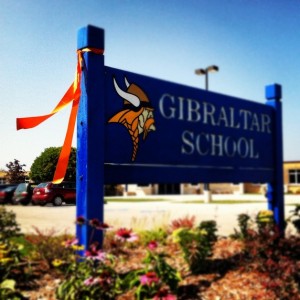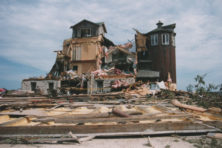Puerto Rican Struggle Hits Home for Families With Door County Ties
- Share
- Tweet
- Pin
- Share
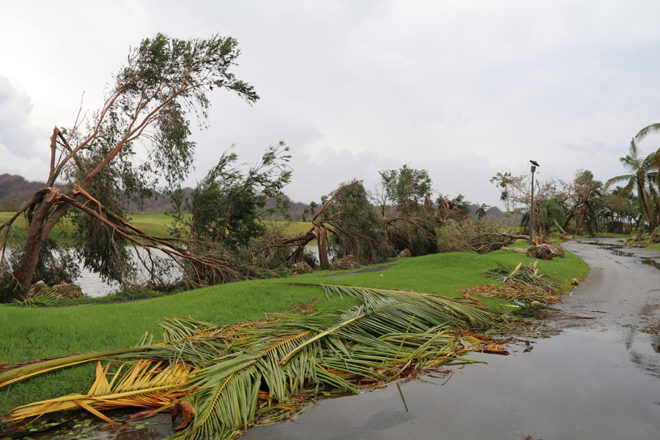
Thirty-five days after the 10th-strongest hurricane ever recorded ravaged the island of Puerto Rico, Alex Reina still struggles to get updates from his family there.
“They only get a window of cell phone signal,” Reina said. “It’s pretty hard to get much out of five or ten minutes of conversation.”
Reina’s mother, step-father, sister and 84-year-old grandmother share space in the only room that remains of their house in Ponce, a city of 166,000 people on the south shore of the island that was battered by Hurricane Maria Sept. 20. The hurricane is estimated to have caused a minimum of $15.9 billion in damage, and as much as $95 billion. Fifty-one people have been confirmed dead from the hurricane, but experts expect that number to rise.
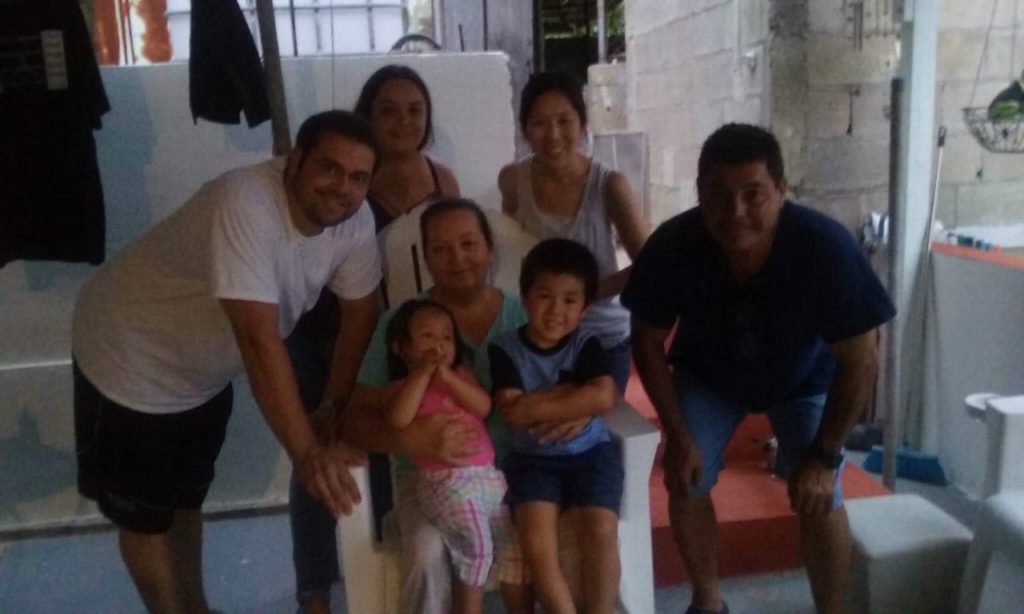
Alex Reina (left) with his family in Puerto Rico before Hurricane Maria destroyed his parents’ home. Submitted.
“They’re struggling just to survive,” said a frustrated Reina, who graduated from Gibraltar High School in Fish Creek in 1999 and now lives in Milwaukee. He split his childhood between Puerto Rico and Milwaukee but when he was 14 his family moved back to the island for good. Reina found a connection through a cousin that allowed him to stay, moving to live with a family in Ephraim who he said all but adopted him. “I count my blessings every day.”
From afar, he watches for updates on the island and his childhood home that he said is now unrecognizable. Less than 25 percent of the island has electricity. Water is scarce. Basic services are all but non-existent on much of the island.
“People are using buckets for bathrooms, taking it into the yard and dumping it,” Reina said. “It’s worse than you can imagine.”
In Sister Bay, Amy Smith is settling into a temporary life with her three children age 6, 9 and 11. They’ve lived in Dorado, Puerto Rico, for two years, where her husband Peter is CFO of Evertec, a payment processing company. It’s one of the nicer areas of the island, but that didn’t mean anything to Maria. They rode it out in their son’s bathroom for 16 hours, scooping water off the floor as rain flooded in through the night.
“It was coming through the vents,” Amy said. “It was such a horrible feeling to not have any information. You’re completely cut off.”
Her parents in Sister Bay couldn’t contact her for 57 hours, until Peter was finally able to get to work and call from the office Friday. Three days later she found a flight off the island and took the children to Sister Bay, enrolling them at Gibraltar. Her husband stayed behind in Puerto Rico, where his 1,300 employees have come to rely on the office for a sense of normality.
“Our company has been a sort of a refuge for our employees,” he said when reached by phone at mid-day, when he’s able to use his cell phone, since there’s signal at his office. Most residents hunt for signal by pulling over by the hundreds on the side of highways near cell towers. “These are tough, positive people. People who lost their houses are sleeping in cars and coming to work every day. It’s amazing at every level.”
He calls living on the island now akin to a very extended camping experience, with an exhausting quest for necessities.
“I don’t know when water or power is coming,” he said. “Gas is the first thing, because it gives you a chance to go get other things. And with electricity down, places can’t accept cards. So cash is king.”
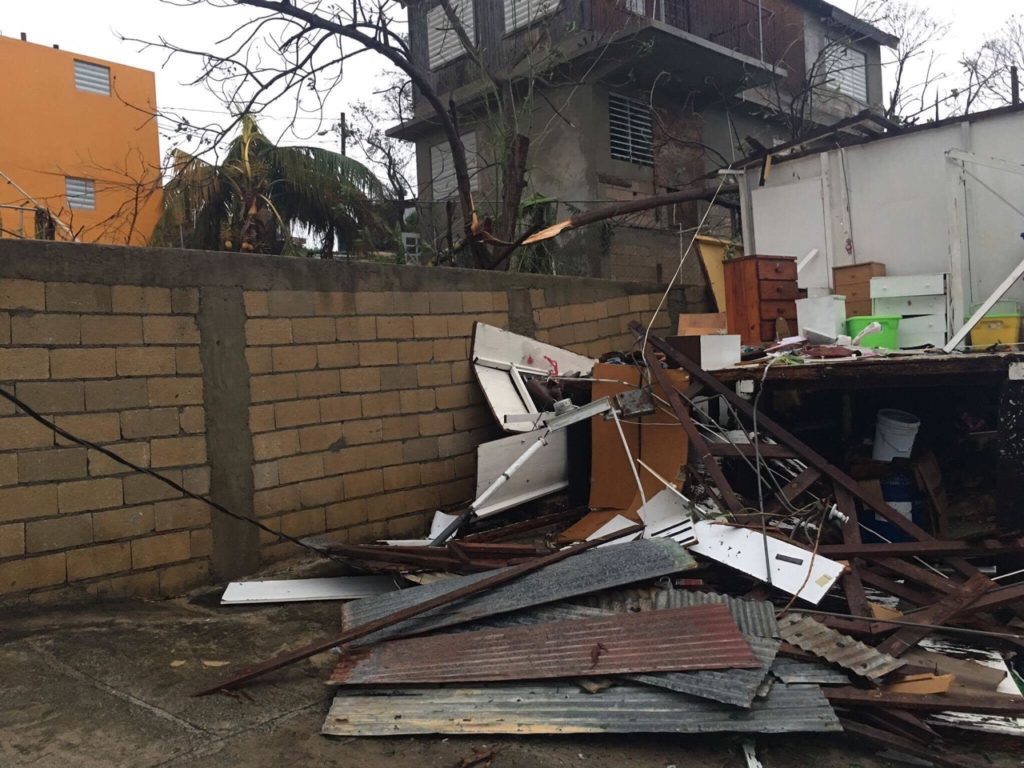
Alex Reina’s childhood home in Puerto Rico was destroyed by Hurricane Maria. His mother, step-father, sister, now all live in their grandmother’s room, the only one that survived. Submitted.
“You spend all your time in lines for gas, food, and money,” Amy said. “You spend all your time just trying to survive.”
Though the day-long gas lines have shortened, the wait for cash can still take a day. Water is obtained from trucks that make their way into communities around the island.
With no running water, he has relied on his pool as a shower, dishwasher and washing machine. He’s been told the power could be back in six months, or nine, or longer. The contract for repairing the island’s power grid was awarded to a company with just two employees that has installed just 4.5 miles of line in its history, so hopes aren’t high.
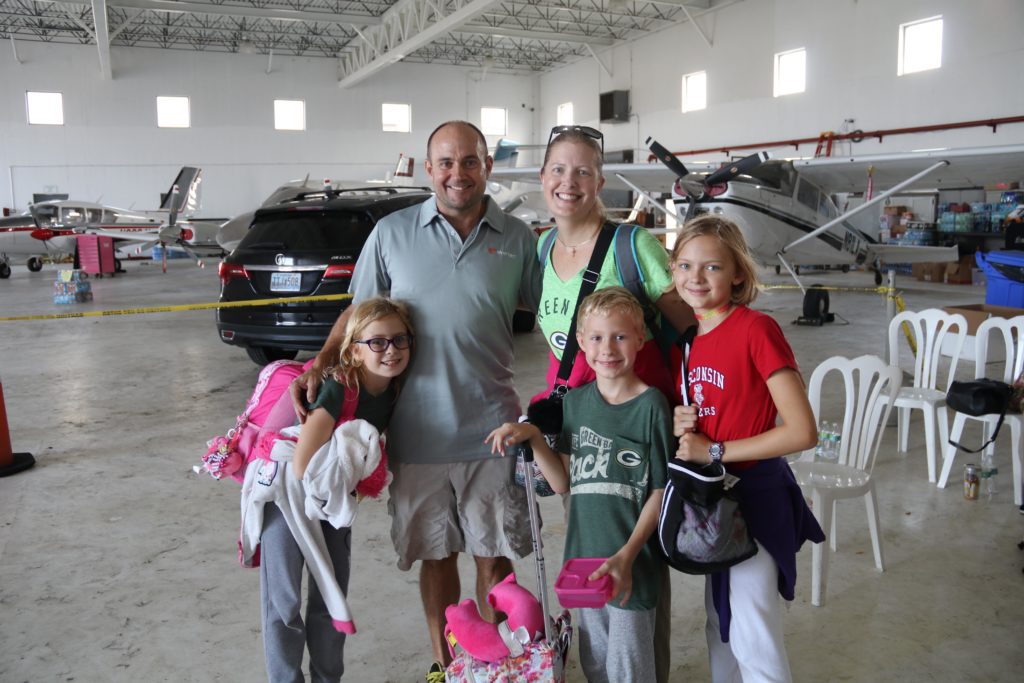
Peter and Amy Smith with their three children at the airport in Puerto Rico when they were finally able to find a flight out for Amy and their kids. Their children are now enrolled at Gibraltar school, but Peter remains in Puerto Rico.
The Smith children, Tenley (11), Grayson (9), and Conall (6), will go to Gibraltar at least through the first semester, when they’re hopeful they can return to Puerto Rico.
“It’s very difficult to be apart,” Peter said. “But we’re very thankful to get welcomed by the community and sincerely appreciate it. In the meantime, I’m trying to make sure I do everything I can for the island.”
On Oct. 12, when nearly 90 percent of the island remained without power, President Donald Trump tweeted, “We cannot keep FEMA, the Military & the First Responders, who have been amazing (under the most difficult circumstances) in P.R. forever!”
The tweet confirmed what Amy Smith and Reina both feared.
“I’m worried that people are going to forget about it,” Amy said.
“If this were Hawaii they’d be all over it,” Reina said. “They’re dumping on this little island and people are dying because of it. My parents didn’t have much, but they worked for what they did have. Now that’s all gone. Grinding it out day by day has hard enough. Now magnify that by a disaster like this. What do they do now?”
Alex Reina has created a YouCaring fundraising page to raise funds for his family in Puerto Rico to rebuild their home.
Peter Smith is working with the Institucion de Ninos Andres, an orphanage near his home, to repair the facility












